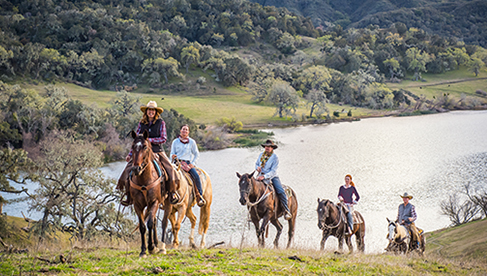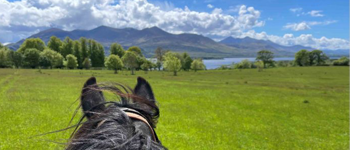The Secrets to Successful Barn Vaccinating
What worming and vaccinating a herd of 100 horses can teach you about patience and life.
by Molly Murphy
The weather's getting warm again, which means horse people everywhere are worming and vaccinating their herds. Vaccination day never really struck a chord with me when all I had to contend with was my bombproof 20-year-old pony, but at The Home Ranch, worming and vaccinating is turned into a daunting multi-day task as the wranglers work to vet out over 100 horses. Luckily for me, vaccination time perfectly coincided with my first week of work at the ranch, meaning I got to be a front-and-center participant in all of the festivities.
Because The Home Ranch utilizes natural horsemanship training and therefore has many level-headed riding horses, the first day ran pretty smoothly, as we got into the rhythm of catching a horse, feeding it the apple-scented wormer, and then quickly pricking it with a multi-prevention vaccine. We ended the day filthy and coated in sticky wormer paste, but overall confident that the next day would run just as smoothly.

The second day was much more challenging. The Home Ranch strongly supports the practice of "letting kids be kids" when it comes to raising colts. The young horses are turned out with the rest of the herd, and, with the exception of lots of love and cuddling from the doting wranglers, are allowed to grow up for a couple of years before they are started under saddle. This gives the horses the chance to grow and mature in the most natural way possible, learning respect and social cues from other horses instead of in an artificial environment with humans.
Although this method leads to incredible, level-headed riding horses who love their jobs and aren't burnt out, it also lends itself to certain challenges. Trying to catch and halter some 30 horses under the age of two, sometimes for only the second or third time in their lives, shove a tube of bad-tasting goo in their mouth, and prick them with a needle was, needless to say, no cake walk. Many of the horses, sensing the excitement from their peers, grew restless and nervous when we started toward them. They would sidestep the medication we hurled in their direction. By the end of day two, after using the run-and-attack method to very little success, we realized we needed to reevaluate our methods.
It's very easy to get frustrated in a situation like this, but it's important to understand that horses, especially younger horses, are sensitive to every interaction they have with humans. From a harsh tone in your voice to a jerky movement of your body in frustration, negative interactions can actually make the horse more difficult to work with in the future, as they may equate human contact with negative consequences. Because of this, we decided to end day two early so we could start again the next day with rested bodies and a fresh perspective.

On the beginning of day three, we had around a dozen young horses left to catch and vaccinate. While our method the previous day had been a more aggressive, combat-style attack, we now realized that the young stock would be much more receptive to rewards than punishment. Because of this, we spent the first hour or so gaining the babies' trust by simply rubbing their necks and talking to them in hushed tones. By simply changing our approach to a calmer, lower-energy method, we were able to very easily vaccinate and worm the majority of the remaining horses, including a few that were known to be afraid of needles or injections.
The few that were still proving challenging were finally vetted using more creative methods, such as mixing up the wormer with sweet feed, and vaccinating them while they were fast asleep. Although getting so many horses of so many varied personalities vetted had its difficulties, it was a fun and memorable first few days of work, and a great way to learn all of the horses' names.
One of my favorite things about our work at The Home Ranch is how every lesson you learn with a horse can directly apply to the rest of your life. For example, you win more arguments and draw more people toward you by being kind and patient rather than irritable and impatient, and sometimes, all anyone needs in life is a little creativity and someone to believe in them.
Molly's Tips and Tricks to a Stress-free Barn Vetting:
•Start with the horses you think may be a little more challenging so you are working with them when you are still alert and fresh.
•Take your time and have patience––many horses are suspicious of oral medications, and moving too quickly or force-feeding can make the experience negative, meaning it will be tougher the nect time.
•If all else fails or you feel you're getting too frustrated, take a break or switch off with another person to keep everything running as smoothly and quickly as possible.
About the Author: Molly Murphy is a college student at KSU studying Creative Writing and an English rider. For her dude ranch blog on Equitrekking.com, she writes about her adventures as a wrangler at The Home Ranch, a Colorado dude ranch that has been welcoming guests since 1980. Visit The Home Ranch and other great dude ranches in Equitrekking Vacation Guide and visit The Home Ranch's website.




